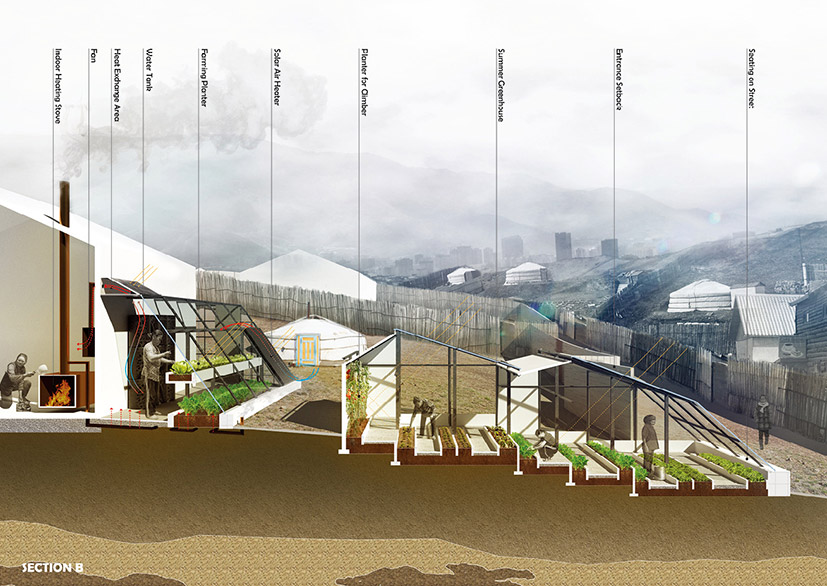10.11.19 - Two Daniels students win awards from the American Society of Landscape Architects
The winners of this year's American Society of Landscape Architects Student Awards include a pair of recent graduates from the Daniels Faculty's MLA program.

Proposed intervention strategies for sand dune stabilization, recreational access, and vegetation growth. Image from Waiyee Chou's thesis project.
Waiyee Chou won an Honour Award in Research for her thesis project on water conservation in the Turpan Depression.
Turpan is an arid region in far-western China that relies on a system of "karez wells" for irrigation. The wells provide drinking water to approximately 50,000 households, but they aren't just infrastructure: they have existed since the days of the Silk Road, giving them immense historical value to the local — mostly Uighur — population. Chou's project examined the well system and proposed ways of supplementing it with new water conservation techniques, like grey-water recycling and atmospheric water generation.
"Through her thesis, Waiyee cleverly tackled a series of issues that link landscape knowledge with cultural heritage and climate change in a part of the world where an indigenous minority, and their way of life, are being challenged," says Chou's thesis advisor, assistant professor Fadi Masoud. "Her intensive research, site visits, and visual translation of these cultural and operative landscapes is of immense value for scholars, designers, and the local inhabitants."
The ASLA jury was impressed by the comprehensive nature of Chou's research. "This study," they wrote, "although regional in scale, promises to restore the ancient connections between people, nature, and landscape in contemporary life."

Section of "phase two." Image from Yantong Guo's thesis project.
Yantong Guo won an Honour Award in Residential Design for her thesis. The project tackled a unique urban design challenge in Mongolia, where nomadic peoples have had their traditional lifestyles upended by increasingly erratic weather patterns and changes in government policy. As a result, many nomads have left the steppes and settled on the fringes of Ulaanbaatar, Mongolia's capital, where they live in what have come to be known as "ger districts." ("Ger" is the Mongolian word for "yurt.")
These ger districts consist of a mixture of houses and tents surrounded by high fences. Municipal services are sparse, so many residents draw their water from communal water kiosks and use pit toilets.
Guo travelled to Ulaanbaatar and consulted with the Ger Community Mapping Centre and GerHub, a pair of NGOs that are working to improve conditions in the ger districts. Based on those conversations, she devised a three-step plan for creating new public amenities for ger district residents.
As a first step, ger communities would build shelters around their water kiosks. The shelters would provide protection from winter weather, and would have public seating. Guo believes this would stimulate community cohesion, setting the stage for step two: greenhouses, which residents would build in their courtyards. The greenhouses would replace some of the fencing between homes, which would further promote community cohesion while also providing a way for residents to grow food. Guo suggests that the greenhouses could even be used as a source of passive heat in winter, possibly reducing the amount of coal that ger district residents need to burn in order to stay warm.
In the third step, Guo envisions the ger district residents, empowered by the first two steps, taking the development process into their own hands. She envisions a future where homes in the districts share infrastructure for waste management and water filtration, leading to a cleaner and safer community for all involved.
"The Mongolian government has failed to provide help to ger district residents," Guo says. "As a result, most of the improvement is from NGOs. The NGOs can't plan large-scale projects, so this could be a starting point."
Her thesis advisor was associate professor Georges Farhat.
Chou and Guo will both receive free registration at the 2019 ASLA Conference on Landscape Architecture in San Diego, where all of this year's ASLA Awards recipients will be honoured with a ceremony. The conference begins on November 15.

